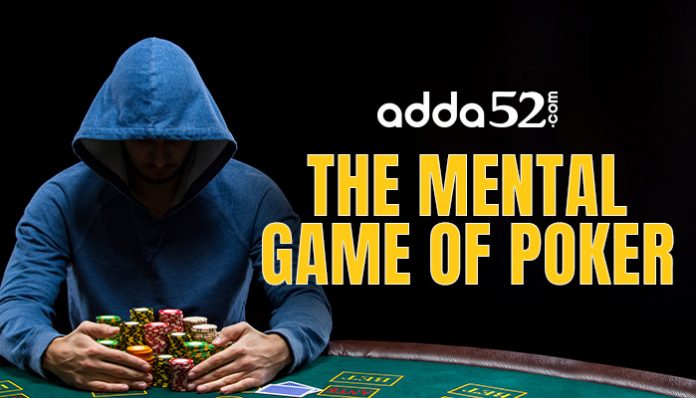The mental game of poker refers to the psychological aspects of the game that can have a significant impact on a player’s performance. While poker is often thought of as a game of strategy and skill, the mental game is just as important, if not more so.
The mental game of poker encompasses a wide range of skills and qualities, including emotional control, discipline, focus, and decision-making. These skills can be developed and honed over time, and can make the difference between a winning player and a losing player.
One of the key components of the mental game of poker is emotional control. Poker can be a highly emotional game, with players experiencing a range of emotions, from excitement and joy to frustration and anger. A player who is unable to control their emotions may make poor decisions and lose focus, which can lead to costly mistakes.
To develop emotional control, players must learn to identify their emotional triggers and develop strategies for managing them. This may involve techniques such as deep breathing, visualisation, and positive self-talk.
Another important aspect of the mental game of poker is discipline. Successful poker players are those who are able to stick to their game plan and make rational decisions, even in the face of adversity. This requires discipline and a willingness to stick to a set of rules and principles, even when it may be tempting to deviate from them.
Focus is also critical in the mental game of poker. In order to succeed, players must be able to maintain their concentration and avoid distractions. This may involve developing a routine or ritual before and during the game, such as taking breaks to stretch or meditate, or listening to calming music.
Finally, decision-making is another key component of the mental game of poker. Successful players are those who are able to make sound decisions based on logic and reason, rather than emotion or instinct. This requires a deep understanding of the game and the ability to analyze and interpret data in real-time.
The mental game of poker is a complex and challenging aspect of the game, but it is one that can be mastered with practice and dedication. By developing emotional control, discipline, focus, and decision-making skills, players can improve their overall performance and become successful at the game of poker.
The Mental Game of Poker: Emotional Intelligence for Players
“The Mental Game of Poker: Emotional Intelligence for Players” is a book written by Jared Tendler and Barry Carter, which explores the importance of emotional intelligence in the game of poker. The book primarily focuses on the mental aspects of the game, and how to develop a strong mindset that can help you become a better player.
The authors argue that poker is not just a game of skill, but also a game of mental toughness, discipline, and emotional control. They contend that the best poker players are those who can manage their emotions effectively and stay focused, even in the face of adversity.
One of the key ideas in the book is the concept of “tilt.” Tilt is a term used to describe a player’s emotional state when they become frustrated, angry, or otherwise emotionally agitated during a game. Tilt can have a significant impact on a player’s ability to make sound decisions, and can lead to a cascade of bad decisions that can ultimately cost them the game.
To avoid tilt, the authors offer a variety of strategies and techniques that players can use to manage their emotions and stay focused. These strategies include mindfulness, visualisation, goal setting, and self-talk. They also stress the importance of taking breaks and stepping away from the game when you feel yourself becoming emotionally overwhelmed.
Another important concept in the book is the idea of “leaks.” Leaks are areas in a player’s game where they are making mistakes or not playing optimally. The authors argue that these leaks can often be traced back to emotional issues, such as fear, greed, or impatience. By identifying and addressing these emotional issues, players can plug their leaks and improve their overall game.
Throughout the book, the authors provide numerous examples of real-world poker scenarios, as well as exercises and worksheets that players can use to develop their emotional intelligence and improve their game. They also offer advice on how to build a strong support system, including friends, family, and coaches, who can provide encouragement and feedback.
“The Mental Game of Poker: Emotional Intelligence for Players” is a valuable resource for anyone looking to improve their game, whether they are a beginner or an experienced player. By focusing on the mental aspects of the game, the book offers a unique perspective that can help players develop the emotional intelligence they need to succeed at the poker table.
Other Card Games – Importance of Emotional Intelligence
Emotional control is an essential aspect of any game, whether it is a strategic card game like 3 2 5, Donkey, Court Piece, Durak, Mendicot, or a trick-taking card game. These games often require players to make quick and decisive moves, and emotions can easily get in the way of good decision-making.
In games like 3 2 5 and Donkey, where the objective is to win the least number of tricks or avoid being the last player to get rid of all their cards, emotions such as frustration, anger, and anxiety can lead to impulsive moves that can cost the player the game. In these games, emotional control is critical to staying focused and making rational decisions.
Similarly, in games like Court Piece and Durak, where the objective is to win the most number of tricks, emotions such as overconfidence and greed can lead to reckless play and costly mistakes. Maintaining emotional control can help players avoid these pitfalls and make smart, strategic moves.
In Mendicot, a popular Indian card game, players must form specific combinations of cards to win the game. Emotions such as impatience or frustration can lead players to make hasty decisions that may not lead to a winning combination. By maintaining emotional control, players can take the time to analyse the cards and make more strategic moves.
Trick-taking card games like Bridge and Hearts also require emotional control. In these games, players must work with their partner to take as many tricks as possible while avoiding certain cards. Emotions such as frustration or anger towards one’s partner can lead to poor communication and coordination, which can ultimately cost the team the game.
In conclusion, emotional control is critical in all types of card games, including strategic and trick-taking games. By staying focused, maintaining discipline, and making rational decisions, players can improve their chances of winning and enjoy the game to its fullest.
Ways to maintain emotional control on the game table
Here are some tips for maintaining emotional control while playing strategy games:
Take breaks: If you find yourself getting frustrated or angry, take a break from the game. Walk away, take some deep breaths, and come back to the game when you feel calmer and more focused.
Practice mindfulness: Mindfulness techniques, such as deep breathing, meditation, or visualisation, can help you stay focused and centred during the game.
Set realistic expectations: It’s important to set realistic expectations for yourself and the game. Remember that winning isn’t everything, and focus on enjoying the process rather than just the outcome.
Focus on the present: Instead of dwelling on past mistakes or worrying about future outcomes, focus on the present moment and the decisions that need to be made right now.
Stay positive: Maintain a positive attitude and focus on the opportunities rather than the challenges. Try to find the silver lining in difficult situations and use setbacks as opportunities for growth and learning.
By incorporating these strategies into your gameplay, you can maintain emotional control and make more rational, strategic decisions. Remember, strategy games are meant to be challenging and enjoyable, so stay focused, have fun, and don’t let your emotions get in the way of a good game.


